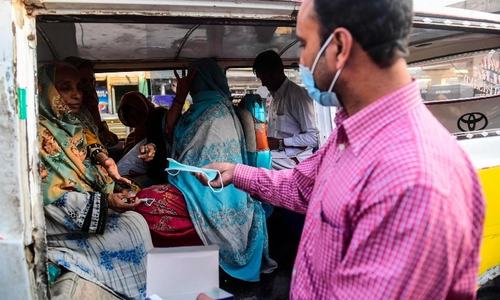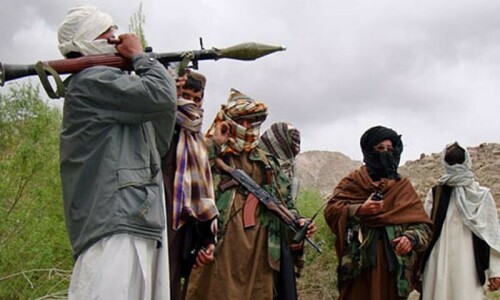ISLAMABAD: While the second wave of coronavirus claimed as many as 105 lives — the second-highest since the disease outbreak — in the past 24 hours, Special Assistant to Prime Minister (SAPM) on Health Dr Faisal Sultan said on Wednesday Pakistan was passing through the same situation it had faced in June.
Earlier, the highest number of deaths was reported on June 15 when the first wave had reached its peak, claiming 124 lives in a day and making the June 8 toll of 90 deaths the second highest.
With over a hundred more deaths, the countrywide death toll from Covid-19 has now jumped to 9,010.
“The virus has even reached those areas which remained unaffected during the first wave of the pandemic. Burden on the hospitals is increasing rapidly due to which we have increased their capacity. I request the masses to strictly adhere to the SOPs,” said Dr Sultan while chairing an online event about Reinforcing Standard Operating Procedures (SOPs) during the second wave of Covid-19 on Wednesday.
The PM’s aide on health explained that the virus was spreading rapidly and the number of cases was increasing with the same pace that was recorded in June.
As Covid claims 105 more lives, PM’s aide finds situation similar to June’s
The online session was jointly organised by the Ministry of National Health Services and the United Nations Children’s Fund (Unicef).
It was informed that with over 440,000 confirmed cases in the country till date, the government was once again taking strict measures to mitigate the spread of coronavirus infection. Provincial governments were following suit with health departments and administrative services enforcing necessary preventing measures at public places and encouraging people to protect themselves and others from the virus by adhering to SOPs.
According to the National Command and Operation Center (NCOC) data, while the national positivity ratio was 7.2 per cent, it was 18.76pc in Karachi, followed by 16.56pc in Hyderabad and 15.99pc in Peshawar.
In the past 24 hours, 2,731 new cases were reported from across the country, with the death of as many as 105 patients. The NCOC data showed that 316 patients of coronavirus were put on ventilators, while the total number of deaths had crossed the 9,000 mark.
Preventive measures
Punjab Health Minister Dr Yasmin Rashid said: “With increase in number of Covid-19 infections, the number of patients in the hospitals has also increased. This has happened because we did not continue to practise the SOPs.
“We must wear a mask when going out as it reduces transmission of infection by 70 per cent. Proper hand washing with soap is very beneficial and so is social distancing. If we continue to practice all SOPs, I assure you that we will counter the second wave of Covid-19 just as successfully as we managed the first time,” she said.
Khyber Pakhtunkhwa Minister for Health Taimur Saleem Jhagra said: “Pakistan countered the first wave very well but now the second wave has hit the country and it can be even more dangerous. I request people to alter their social behaviour in terms of following the SOPs strictly so that neither our health system is overburdened nor is the economic development affected.”
“Despite all difficulties, the first wave of Covid-19 was tackled by Pakistan in a very efficient manner,” said Rubaba Khan Buledi, Parliamentary Secretary for Health, Balochistan. “Responsible civic behaviour of the general public made it possible. Now that the second wave of Covid-19 has hit Pakistan and we need the people to follow the SOPs very diligently.”
Sindh Health Services Director General Dr Irshad Memon said, “Just as the number of cases started to decrease, we became complacent in taking precautions against the virus. The positivity rate, which had come down to around 2.5 per cent, has now gone up to 14pc in the province, but we can control this by practising the SOPs.”
155 response units planned
Meanwhile, the PM’s aide at a ceremony expressed his gratitude to the USAID for its support to establish 155 District Disease Surveillance and Response Units (DDSRUs) across Pakistan. He said it would go a long way in instituting the integrated disease surveillance system in Pakistan and reduce the mortality and morbidity associated with infectious diseases with timely prevention, detection and response.
Executive Director of the National Institute of Health Maj Gen Aamer Ikram explained the importance of such units which would be connected to their respective provinces and ultimately to the federal epidemiology and disease surveillance division housed in NIH Islamabad for timely reporting on all infectious diseases, especially Covid-19.
Published in Dawn, December 17th, 2020

















































